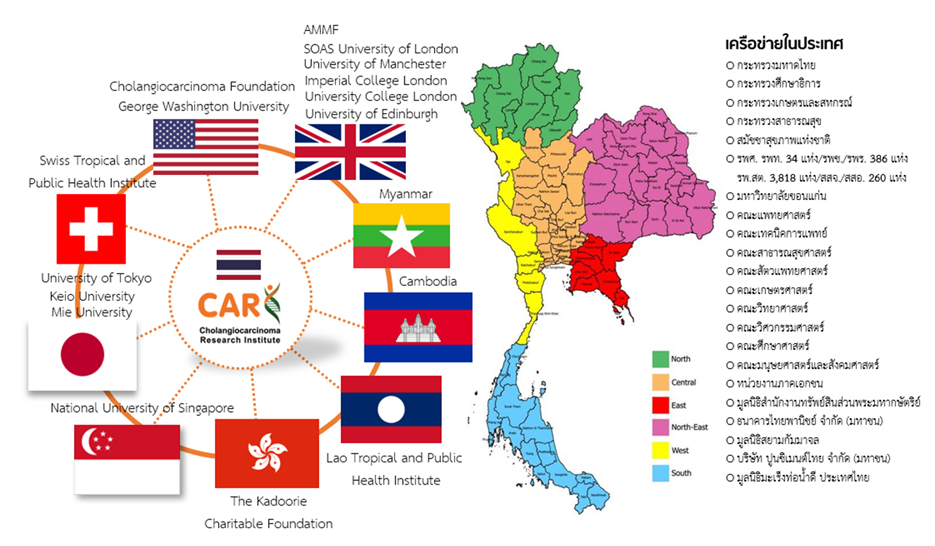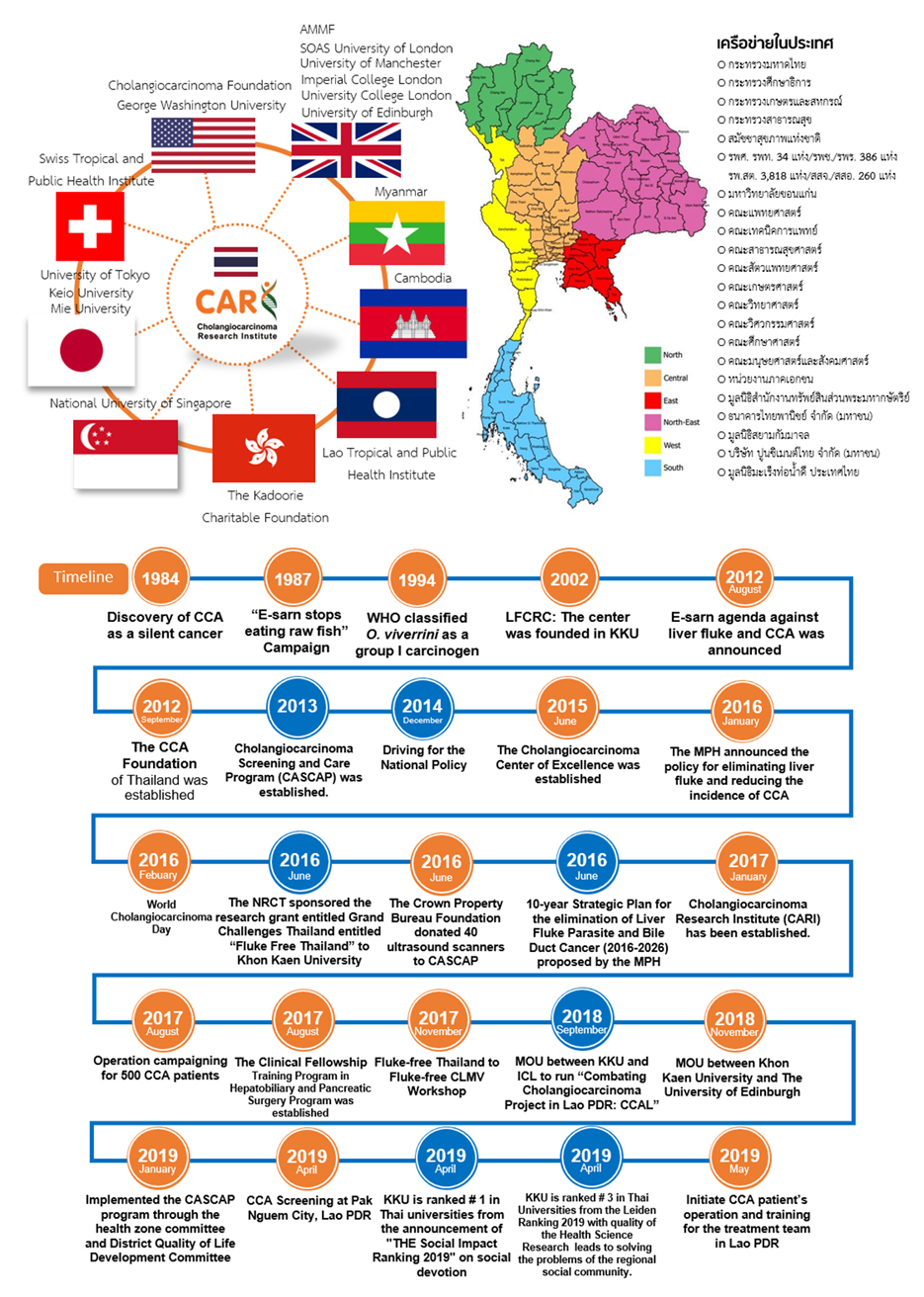
Liver fluke infestation and cholangiocarcinoma (CCA) remain one of the major health problems of populations in the northeast of Thailand, as well as the neighboring countries of Laos, Vietnam and Cambodia. In Thailand alone, over 6 million people harbor the liver fluke (Opisthorchis viverrini). Infection with this parasite is the major risk factor for developing CCA. Each year 20,000 people develop CCA in Thailand alone, most of whom come from the northeast of the country. As Khon Kaen University was the first university established in the northeast region, we have a commitment to provide health care and reduce the disease burden of this cancer. Our research group was initially formed from individuals who were interested in research on liver fluke and CCA. The group has been supported by the Research Affairs of the Faculty of Medicine since 1996, and eventually evolved into the Liver Fluke and Cholangiocarcinoma Research Center (LFCRC) in 2002 on the initiative of visionary staff of the University. Members of the Center come from all health science faculties. In 2016, the Research Center was upgraded to be the Cholangiocarcinoma Research Institute (CARI) of which Dr. Khuntikeo is now the director.
CARI has the biggest CCA biobank in the world, comprising both samples from CCA patients as well as from the risk population from regional communities. We have produced more than 400 international, peer-reviewed publications and more than 150 graduate students. The Center is currently heavily involved in multidisciplinary research which is summarized below:
- Novel approaches for risk assessment of CCA and long-term measures for the prevention and control of opisthorchiasis in endemic communities
- Carcinogenesis of CCA caused by infection and inflammation in order to develop prevention and therapeutic approaches
- The development of treatment and care approaches for CCA patients to improve their quality of life
- Development of a new diagnostic platform for CCA in the northeast of Thailand
In addition, the Cholangiocarcinoma Screening and Care Program (CASCAP), led by Dr. Khuntikeo, was initiated in 2014 by Khon Kaen University with the aim of establishing a comprehensive program for the long-term control and elimination liver fluke infection and CCA. The program has the facilities summarized below:
- The Isan Cohort software (https://cloud.cascap.in.th/) was established in 2014 and has been in daily use since this time. This is an online and real-time database system used for nation-wide at-risk population registration, data recording, monitoring, evaluation and reporting to the Thai Ministry of Health, as well as to the general public. The registration and inclusion of the high-risk population takes place at primary health care hospitals. The at-risk individuals are then transferred for ultrasound screening to district hospitals and suspected CCA cases are referred for further investigation and treatment to super-tertiary care hospitals. Screening is performed simultaneously for up to 500 at risk members of the local population at the primary health care units. To date, there are more than 3,000 health care units enrolled in our diagnostic network.
- An ultrasound screening system has been developed, composed of ultrasound machines with mini-PACS, which allows the transfer of ultrasound images through the internet into the Isan Cohort database. This system also includes online-based consultation where the images can be reviewed by an expert radiologist for confirmatory diagnosis. In addition to increasing the screening capability, hepatobiliary ultrasonography training courses are offered for radiologists and general practitioners.
- Network hospitals are designated for the diagnosis and treatment of CCA and for further management of suspected CCA cases identified by ultrasound screening. This network comprises all 7 super-tertiary care hospitals in the northeast of Thailand. Moreover, hepatobiliary and pancreatic surgery training courses are provided to increase the number of specialist surgeons available to perform potentially curative or palliative surgery.
Significantly, Dr. Khuntikeo established the Cholangiocarcinoma Center of Excellence in 2015 at Srinagarind Hospital, Faculty of Medicine, Khon Kaen University, which enables patients in the first stages of the disease to undergo surgical, potentially curative, treatment. The Center has the mission to offer training to doctors, nurses and staff members in the treatment of the more than 20,000 patients from the northeast provinces if Thailand. These patients have liver fluke infection and come from large hospitals throughout the region. The center has an operation room for CCA patients as well as 2 intensive care unit beds and a patient ward for 19 people.
Furthermore, we are working together with the Data Management and Statistical Analysis Center (DAMASAC), lead by Dr. Thinkhamrop at the Faculty of Public Health, Khon Kaen Univiersity. The DAMASAC is excellent center for data management and statistical analysis for health science research who provides regular workshops on statistics, data analysis and manuscript writing for the research organizations requiring intensive regulatory environments. DAMASAC also train graduate students in data analysis and scientific writing
In 2018, The CARI in collaboration with Lao Tropical and Public Health Institute (Lao TPHI), Lao Ministry of Public Health under the support of the Kadoorie Charitable Foundation and Imperial College London (ICL) are running “Combating Cholangiocarcinoma in Lao PDR (CCAL) project, which seeks to leverage the CASCAP program to the Mekong Basin River Country of Lao PDR, where OV infection and OV-induced CCA are major public health challenges. Investment now is allow a multidisciplinary approach for the first time and with Lao PDR now awakening to the problem and the combined parasitological, zoological, water disinfection, sanitation, epidemiological, sociological and anthropological approach to disease prevention, combined with better means of disease detection with population screening, improved imaging and biomarkers for early detection – and for those with incurable cancer, improved end of life care, will allow the problem to be addressed in an integrated way for the first time. We are also aiming to expand the program to the others great Mekong sub-region countries where face the same burden.

Figure 1 The timeline for combating liver fluke and cholangiocarcinoma
